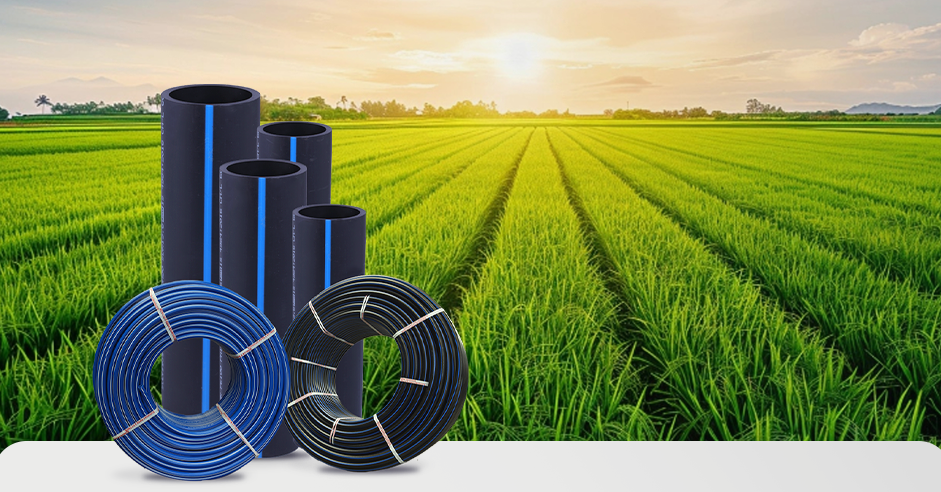Why Texas hdpe pipe manufacturer Is Setting Standards in Quality Production
Recognizing the Secret Benefits of HDPE Pipeline for Water and Wastewater Monitoring
Making use of HDPE pipe in water and wastewater management presents countless benefits that warrant consideration. Its remarkable sturdiness and long lifespan make it a favored selection for many projects. Additionally, the material's resistance to deterioration and chemical damages improves its reliability in various environments. Nonetheless, the advantages expand past simply durability and resistance. Exploring its cost-effectiveness and ecological effect exposes a lot more compelling reasons for its prevalent fostering in modern infrastructure
Remarkable Resilience and Durability

HDPE pipe attracts attention for its outstanding toughness and durability, making it a preferred selection in water administration systems. Created from high-density polyethylene, these pipes can withstand substantial pressure and stress and anxiety, making certain trustworthy performance in time. Their robust nature allows them to endure extreme ecological conditions, consisting of temperature level changes and dirt motions, which can cause various other products to stop working.
The life expectancy of HDPE pipelines usually goes beyond half a century, supplying an economical option for towns and markets alike. In addition, the product's light-weight residential properties streamline setup, minimizing labor expenses and timeframes. This sturdiness lessens the requirement for constant repair services or substitutes, better enhancing its financial appeal.
In water management applications, the reliability of HDPE pipes indicates less disturbances and improved solution connection, making them important to sustainable facilities development. The combination of durability and long life strengthens HDPE's function as a foundation in efficient water monitoring options.

Resistance to Corrosion and Chemical Damages
While many products succumb to deterioration and chemical damage with time, HDPE pipes show amazing resistance, making them ideal for different water management applications. This durability stems from the molecular framework of high-density polyethylene, which is inherently non-reactive and does not wear away like metals or degrade from direct exposure to severe chemicals. Therefore, HDPE is extremely efficient in environments with aggressive substances, such as wastewater systems that may have acids, bases, and organic solvents.
Additionally, HDPE pipelines can stand up to ecological elements such as soil acidity and saline problems, additionally enhancing their viability for varied applications (American Plastics HDPE Pipe for Oilfield). Their ability to preserve structural stability over time lowers the danger of leakages and failures, which is vital in making certain the security and reliability of water distribution and wastewater monitoring systems. The resistance to corrosion and chemical damages noticeably adds to the overall performance and long life of HDPE piping remedies.
Cost-Effectiveness and Financial Benefits
When considering the financial effects of water management systems, the cost-effectiveness of HDPE pipelines ends up being evident. These pipelines supply reduced setup and maintenance prices contrasted to standard materials like metal or concrete. Their lightweight nature streamlines transport and installment, causing lowered labor expenditures. In addition, HDPE pipes show a long lifespan, commonly going beyond half a century, which translates to less replacements and long-lasting savings.
The resistance of HDPE to deterioration and chemical damage reduces the need for expensive repair work and substitutes. The pipelines also support effective water flow, reducing power prices connected with pumping systems. By minimizing leakages and water loss, HDPE pipelines contribute to significant financial benefits for municipalities and industries alike. On the whole, the first financial investment in HDPE piping can produce significant financial returns over the life-span of the water administration system, making it a prudent selection for sustainable facilities advancement.
Environmental Sustainability and Minimized Influence

Convenience and Adaptability in Installation
Due to their special properties, HDPE pipes offer remarkable flexibility and flexibility in installation, making them ideal for a large range of applications. Their light-weight nature permits easier handling and transport, minimizing labor costs go to my blog and installment time. HDPE pipes can be bent and formed to fit various surfaces and job demands, which is particularly valuable in testing environments.
In addition, their resistance to deterioration and chemical damages permits installation in diverse settings without the need for specialized protective coverings. The capability to fuse joints develops a continual, leak-free system, boosting the total honesty and integrity of the setup. HDPE's versatility also suits ground motion, decreasing the risk of damages in locations susceptible to moving soil. Overall, these characteristics make HDPE pipelines not only functional yet also a recommended option for water and wastewater administration systems.
Often Asked Inquiries
Exactly How Does HDPE Pipe Contrast to PVC in Water Administration Applications?
HDPE pipe supplies remarkable flexibility, resistance to rust, and longevity contrasted to PVC. Its lighter weight promotes simpler installment, while its long life expectancy reduces substitute costs, making HDPE a recommended choice in water management applications.
What Is the Life-span of HDPE Water Lines Under Typical Conditions?
Under normal conditions, HDPE pipelines can have a lifespan varying from 50 to 100 years. Their resilience over at this website and resistance to rust contribute to their long-lasting efficiency in numerous applications, making them a trustworthy selection for framework.
Are HDPE Pipeline Recyclable After Their Life Span?
Yes, HDPE pipelines are recyclable after their life span. Pipe Manufacturing Midland TX. They can be processed and repurposed into brand-new items, considerably lowering environmental influence and promoting sustainability within the market, making them a green choice for piping remedies
What Is the Setup Refine for HDPE Water Lines?
The setup procedure for HDPE pipelines includes website preparation, trenching, pipeline blend or mechanical joining, backfilling, and stress testing. Correct strategies assure a sturdy and reliable system for delivering water and wastewater properly.
Can HDPE Piping Be Made Use Of for Both Drinkable and Non-Potable Water Solutions?
Yes, HDPE pipes can be used for both drinkable and non-potable water supply. Their flexibility, longevity, and resistance to rust make them ideal for different applications, ensuring secure and effective transport of water in different contexts.